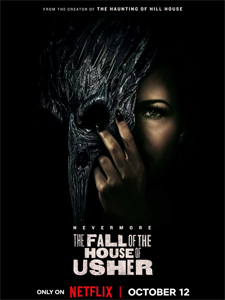“The Fall of the House of Usher” (Netflix) must’ve been a fun writing project for Mike Flanagan and his staff of eight scribes. They use Edgar Allan Poe’s 1839 short story as a framing mechanism, then riff on Poe’s other works to explore a modern collapse of corrupt corporate royalty over eight episodes. The already classy project (as is always the case with Flanagan) then gets more artistic as characters recite poems (which are actually Poe poems).
Unless a viewer believes it’s disingenuous to use early 19th century Gothic horror fiction as a lens to view horrors specific to the past 50 years (a valid argument), “House of Usher” is a fascinating bit of repurposing.
In the most notable change, Flangan et. al. provide a grand narrative; Poe was more interested in putting his internal dark mood on the page via language. In another contrast, Poe was famously depressed, but Flanagan seems like a well-adjusted, happy person who happens to be an excellent horror auteur.
“The Fall of the House of Usher” (2023)
Netflix; eight episodes
Creator: Mike Flanagan, based on the works of Edgar Allan Poe
Stars: Carla Gugino, Bruce Greenwood, Mary McDonnell
If one accepts there is such a thing as “Poe by way of Flanagan,” “Usher” is a remarkable modernization. Flanagan brings back his usual troupe, and each episode tells of the downfall of one family member – starting with the middle-aged generation and working up to aging patriarch brother Roderick and matriarch sister Madeline.
The Ushers’ immorality and mortality
I had one minor quibble for a while: the not-quite-right pairings of older and younger versions of the same characters (something that also bothered me in “The Haunting of Bly Manor”). But I got over that by the end, as I started to see Zach Gilford and Bruce Greenwood as Roderick; Willa Fitzgerald and Mary McDonnell as Madeline; and Malcolm Goodwin and Carl Lumbly as Augie, the state’s attorney who chats with Roderick in a rickety house (as per the short tale) in the framing story.
Amid a grand meditation about mortality and morality (and immortality and immorality), each installment is a mini-movie about the shattering of each Usher’s hubris, with gore and shock value as sprinkles on the cake. My pick for the best is Dani Parker’s “The Tell-Tale Heart” (episode 5), wherein pharmaceutical bigwig Victorine Usher (T’Nia Miller) loses her mind in an inside-out “Sixth Sense” narrative.
That one leans tragic, but leaning more delicious in black-comedy fashion is Flanagan’s and Rebecca Leigh Klingel’s “Goldbug” (6), showing the downfall of Tamerlane Usher (Samantha Sloyan, always reliable as a Flanagan villain). Her meticulous PR campaign is in truth a delicate house of cards, and it only takes her losing her marbles during a press conference to send it crashing down.

The miniseries’ view of large, corrupt corporations is ultimately somewhat simple, as it doesn’t acknowledge the role government plays in growing and securing the corporation’s power. And it posits regulators as potential heroes. That’s to be expected, as 2023 is a more statist time than 1839.
Madeline has a conclusive rant where she cringingly lambasts society for its treatment of women, yet she also pridefully notes her accomplishments (which aren’t truly her own). I suppose writers can get away with stuff like this, because villains aren’t supposed to be logical. But, for the sake of finding a criticism, “Usher” edges into preachiness sometimes.
Poe’s work serves as strong foundation
On a character level, though, the miniseries is smartly written. All the Ushers are fascinating, even as their fates hang over them in ways only the viewer is aware of. Although it’s not a whodunit, it is a “how did this come about.” We get intrigue about Roderick’s and Madeline’s key New Year’s 1980 meeting with a mysterious woman played by Carla Gugino who seems to pop up throughout history like Forrest Gump.
Although the Ushers are evil, they aren’t cartoons. The choices make sense for Roderick and Madeline – even though they must block out good moral voices like Augie and Roderick’s first wife Annabel Lee (Katie Parker). The Ushers and their gravelly uber-attorney Arthur Pym (Mark Hamill in one of his best roles outside of Luke Skywalker – once you get used to that voice) are the players, not the game designers. I couldn’t saddle them with all the blame for being who they are.
“Usher,” directed by Flanagan and Michael Fimognari, has fewer on-the-spot scares than “The Haunting of Hill House” and “Midnight Mass.” That makes sense as it leans toward mood horror in a way appropriate for Poe. But it might leave the most extreme chill in the room afterward. The flashbacks do end up tying most of the timeline into a bow. But “Usher” leaves creepy gaps that viewers must fill in for themselves – such as the details of the demise of one character who doesn’t make the past-to-present transition.
Poe’s work – and the 20-page “Usher” short story specifically – have been adapted many times, and it’s always odd to juxtapose work from before the age of motion pictures with its translations to film and TV. The “Simpsons’ ” “Treehouse of Horror” segment with James Earl Jones reciting “The Raven” had been one of my favorites, for its simplicity and fidelity.
Flanagan’s “Fall of the House of Usher” is more narratively ambitious, and because of that, it inevitably drifts from its core of Poe. But it shares a pitch-black beauty with the old writings. When Greenwood narrates “The Raven” amid a vicious thunderstorm, he might not be Jones, but the emotional gravity is weighty enough that I almost want to try to read the 200-year-old prose and poetry.

